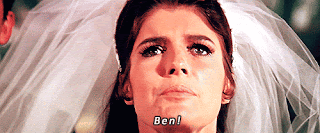The Graduate is a movie that seems to defy explanation. Even Roger Ebert was greatly divided on the film. When he first saw it he called the movie "the funniest American comedy of the year". When he reviewed it again for the 30th anniversary special he called it "a movie about a tiresome bore and his well meaning parents."
What I think divides the younger and older Roger Ebert, and people in general, is that Dustin Hoffman's character, Ben Braddock, doesn't really change. The beginning of the film tells a lot thematically. Ben is on a moving walkway in an airport and while he is "moving forward" he is not walking or moving himself anywhere. People pass him and he watches them go by. Ben is also facing towards the left, which in traditional American film means going backwards or against the grain.
Throughout the course of the movie Ben doesn't do much. He sits in his pool and ignores his family friends. The main conflict of the film, Ben's affair with Mrs. Robinson, is started not by Ben but by Mrs. Robinson. The argument can be made that Ben changes when he falls in love with Elaine and follows her to Berkley and then again follows her to her wedding.
But Ben's reasons are still completely selfish. He is in love with Elaine because she is in the same "not moving" position he is. There are several moments where this is implied in the cinematography, most famously the runnning scene.
This begs the question that is asked every god damn semester in every film class. In film, does the main character have to change? I'd argue no. Ben doesn't change much in The Graduate. But what does have to happen is that audience has to see that the character has the ability to change but, for whatever reason, does not. Nichols shows this inability to change as a tragedy as Ben and Elaine pull away. What we thought was a happy tale of romance is just the characters realizing they haven't changed.
My goal for this semester is to make a movie where a character is given multiple opportunities to change but ultimately fails to do so. I think it's a powerful form of story telling that encourages introspection. While it is easy to say this, and showcase a movie in which this happens, it will be difficult to pull off. It will require constant rewriting and meticulous shot planning. I never thought I would say this but I disagree with Roger Ebert. The Graduate is a film that stands the test of time. Not as a comedy, but as a complex movie about depression and the selfishness in passiveness.






No comments:
Post a Comment